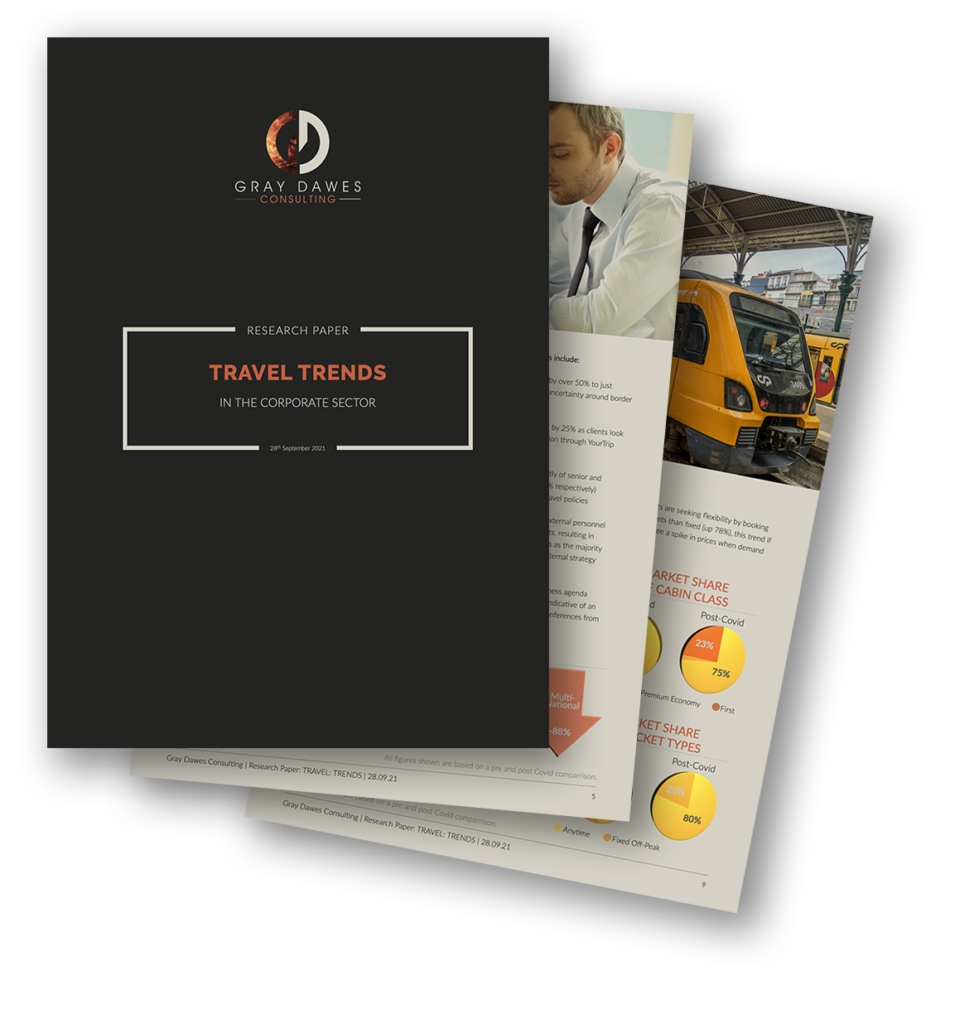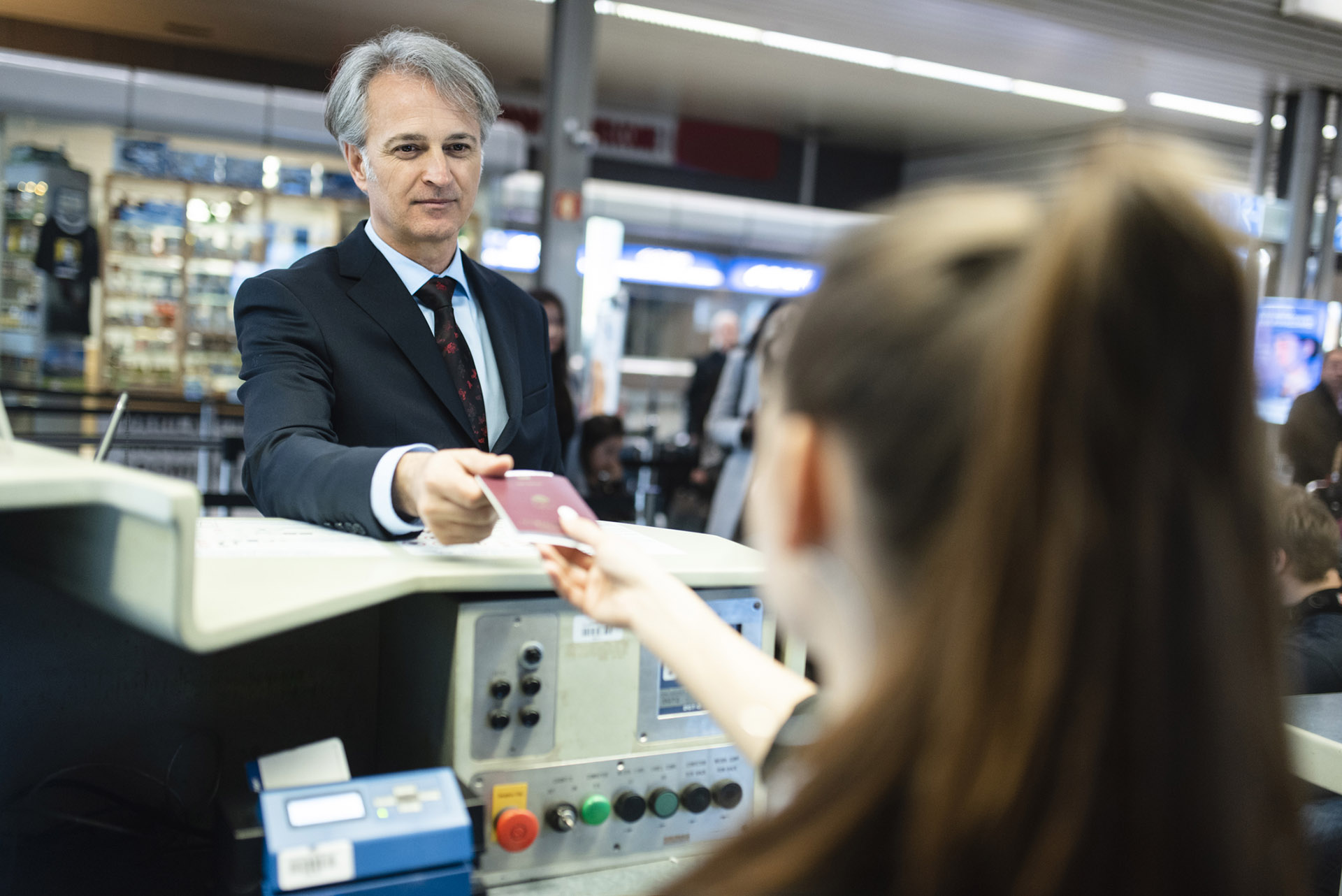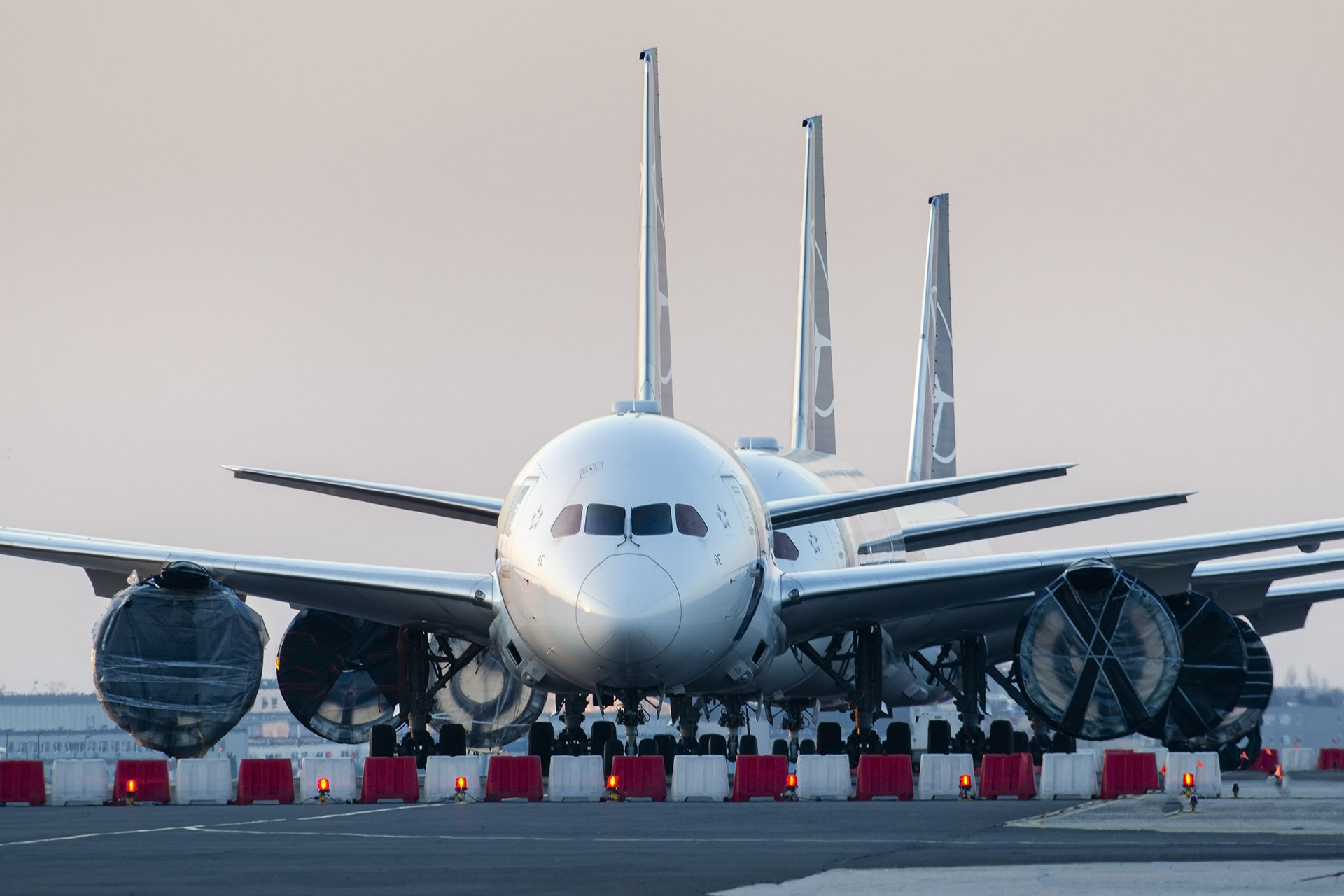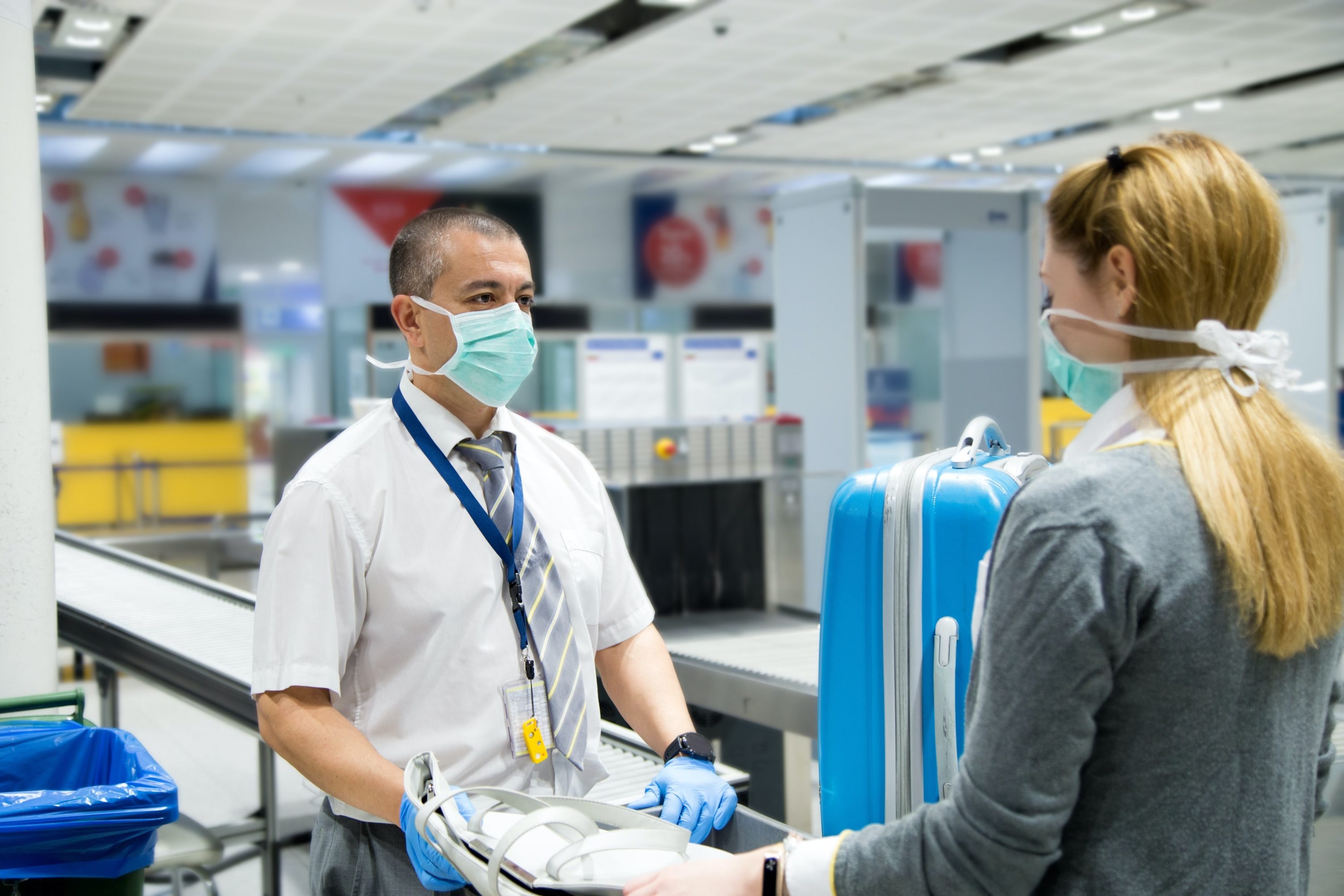We asked our Head of Gray Dawes Consulting, Aman, Pourkarimi, to look at the impact COVID-19 has had on our client booking behaviour. That involved taking a benchmark of pre-pandemic activity, which he classified as the period September 2019 up until March 2020, just before UK lockdown. Aman then ran a comparison with the last six-month period i.e. March 2021 to September 2021. What Aman was looking for here were the pertinent trends in booking patterns that could be identified. He then provided recommendations that can help shape your travel programme, particularly as 70% of businesses have restarted booking travel in the last six-month period.
In this video, Aman summarises his findings on the key travel trends and offers his recommendations for business travel managers in light of his analysis.
Below we give a more detailed summary of the report and share what you need to know to help get your business travel back on track.
General Trends & Recommendations
The first trend is that advance purchase is around half what it was pre pandemic, so people are booking 6 days in advance compared to 2 weeks pre pandemic. That’s undoubtably due to uncertainty of changing border restrictions. I am anticipating that border controls are starting to stabilise, at least in bound inbound into the UK, with restrictions reducing greatly as we have seen with the abolishment of the traffic light system with just 7 countries on the no go list. We are anticipated that to be a stable picture in 2022. What see some change is outbound travel. We have seen that the US will open up on November 8, Singapore opened to the UK last week with conditions, Australia is due to follow before Christmas. China is a little unclear, but we believe it will open up to international visitors by end of this year, early 2022. However, with our rising covid levels, we have experienced already morocco has re-established restrictions for UK travellers, and others may follow. So, I am recommending a 2-week advance purchase, to react to changing border restrictions while keep costs low which are rising. More on that in a moment.
Another noteworthy trend is around the purpose of the meeting and which level of the organisation are travelling. Currently internal meetings conducted by senior and middle managers are leading the way as organisations look to conduct the relevant brainstorming sessions needed to restart. We have seen an uplift in the external meetings in the last few weeks as I think there has been more confidence to request face to face meetings with parties outside your organisation. My recommendation here is that any meeting which materially impacts business continuity, i.e. supplier, customer and strategy meetings should be conducted face to face as studies clearly show buy in and speed of decision making is greatly enhanced when conducted face to face.
Hotels
Looking at hotel bookings, while the overall transactions are lower than pre pandemic, the length of stay has more than doubled. This is as of result of corporates attempting to greater utilise the impact of their trips by perhaps having several meetings or adding a leisure component. My recommendation here is to ensure your programme has sufficient coverage of apartment hotels and your policy is clear on what can be expensed when a business trip is combined with leisure.
The positive here is that despite lengthier trips, the cost of hotels is still heavily discounted. I am projecting double digit discounts to continue into 2022, particularly in metropolitan cities as home working continues to lessen demand in those business travel cantered locations. Therefore, my recommendation is to switch to dynamic hotel pricing unless you have over 300-400 room nights into a hotel per annum to leverage a discount. Another essential recommendation is to ensure that any hotel booking is made through your managed programme to allow your risk assessment, approval process to run efficiently. You can measure this by examining any rail, car and air journeys that incurred an overnight stay.
Air
Air travel has been the slowest rate of recovery which is linked to border restrictions. However, we have seen that whenever restrictions are lifted, such as domestically and intra Europe, the prices rise sharply. We have already witnessed 400% increases in flights to the US around the 8 November when the border restrictions are eased. My recommendation is to book tickets in advance with COVID19 friendly change policies. Look at for those in the terms and conditions.
Rail
Moving to rail, the key trend here is in European high-speed rail has seen prices rocket. This can be attributed to measures governments in France and Germany enforced when bailing airlines out in those regions where flights on routes below 2.5 hours were reduced or even totally removed where a high-speed rail link was available. My recommendation here is partner with a travel management company which has European rail content.
Car Hire
Lastly, we focus on car hire which has seen the fastest rate of recovery. This is linked to remote working where travel to meetings is not as often to central destinations served by rail but more urban locations and of course the preference to drive for social distancing purposes. However, this surge in demand has put a squeeze on supply, certainly in the US. Therefore, if you need a car hire, book in advance or as I recommend, select to meet in a central location served by rail.

That’s it for our breakdown on the impact of Covid-19 on business travel. I hope you found our information useful and recommendations insightful. We will be running updated analysis every quarter so please do follow Gray Dawes Consulting on LinkedIn. If you need support with ensuring your travel programme is ready to scale up in terms of transaction volumes, we are running a GET SET programme focusing on updating the travel policy, approval process and supplier programme to assist meet with duty of care, budgeting and maintaining business continuity. Please look at our website for more information.
Aman Pourkarimi
Head of Consulting
TAKE THE FINAL STEP
TO BETTER TRAVEL
Gray Dawes Consulting is an impartial, in-house team of experienced travel data experts who combine 90 years of experience, market-leading tools and analytical thinking to drive corporate travel booking efficiencies, cost savings and traveller satisfaction.
Our approach is to fully understand a client’s organisation; its culture, employees and business objectives, which helps us make informed, realistic, achievable and measurable recommendations about enhancing your travel programme.
We typically deliver up to 22% in savings by looking at 28 KPI levers surrounding costs. So, if driving value is your goal then our holistic approach is designed to assess and measure efficiencies at every step of the booking process.
We make sure we have every eventuality covered to ensure your travel programme operates more efficiently through change.
To help you navigate the changes of business travel, we’ve created the brand-new Traveller Toolkit. This invaluable online resource is packed full of easy-to-use guides and checklists for every stage of every journey. We detail exactly what you need to know and do before, during and after your trip.
You’ll also find innovative and interactive virtual trips, which walk you through each step of being at the airport, on the train and in the hotel. You can even check the travel restrictions and health status of your destination with our comprehensive COVID-19 Country Tracker, updated five times daily to ensure you have the very latest information to help keep you and your travellers safe.
Travel is changing. But with common sense and a good TMC behind you, travellers should have the confidence to once again take to the skies. It’ll soon be business as (un)usual.







